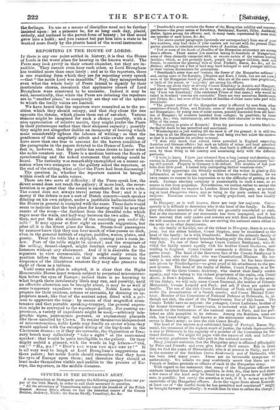REPORTING IN THE HOUSE OF LORDS.
Ir there is any one point settled in history, it is that the House of Lords is the worst place for hearing in the known world. The Peers may look pretty in their ornate chamber, but they are in- audible. They cannot even hear each other, as Lord Brougham has testified more than once lately ; and as to the reporters, there is one standing form which they use for reporting every speech —that " the noble Lord was inaudible." Nay, they misapprehend even what the whole body of Peers intend to signify by their inarticulate chorus, insomuch that applausive cheers of Lord Brougham were construed to be sarcastic. Indeed it may be said, acoustically, that while the Peers are debating the reporters are in "another place," so completely are they out of the sphere to which the lordly voices are limited.
We have heard that the reporters were consulted as to the po- sition which they should occupy, and that they chose the one opposite the throne, which places them out of ear-shot. Various reasons might be imagined for such a choice : possibly, with a nice appreciation of relative merits, they might prefer the Peers in their picturesque rather than their eloquent capacity ; possibly they might not altogether dislike an incapacity of hearing which must considerably lighten the labours of writing : so that the gentlemen of that singularly adroit and wide-awake craft may have more than one bias to account for the barren condition of the paragraphs in the papers devoted to the House of Lords. The fact is, however, that the public has some desire to know what the noble senators say. There is a medium between the floods of speechmaking and the naked statement that nothing could be heard. The curiosity was remarkably exemplified on a recent oc- casion when two strangers to the gallery asked the reporters, at the end of the sitting, what subject the Peers had been discussing?
The question is, whether the reporters cannot be brought within reach of the noble voices.
There are two sorts of difficulty : if the Peers speak low, the direct sound does not reach the gallery; if more loud, the rever- beration is so great that the sound is smothered in its own echo. The sound does not always travel across the floor • and it is a mercy if the debate is not a sort of Dutch concert—each speaker dilating on his own subject, under a justifiable hallucination that the House in general is occupied with the same. These facts would seem to indicate that the best place for hearing would be near the centre of the room—the furthest from the dreadful echo which rages near the walls, and half-way between the two sides. Why, then, not put the able wielders of the recording pen under the table? It may appear at first sight an uncouth suggestion, but after all it is the fittest place for them. Steam-boat passengers by summer know that they can hear much of what passes on deck, even in the general hubbub of engine, paddles, waves, plates, and gossip. Treat the table like a skylight, opening into a roomjie- low. Part of the table might be opened ; and the structure of the ceiling, funnel-shaped, might conduct every sound to the listeners without any abatement. And if it is desirable for the reporters to view ceremonials, they might easily retain the position before the throne ; so that in attaining access to the eloquence of the illustrious senators they may also preserve the sight of them as a tableau. Until some such plan is adopted, it is clear that the Right Honourable House must remain subject to perpetual misconstruc- tion before the eyes of Europe ; indeed there is no knowing to what length these involuntary libels may run, and possibly, until an effective alteration can be brought about, it may be as well if some temporary expedient were adopted. Noble Lords might prepare for their orations, solemn or sarcastic, by donning an ap- propriate mask, like that of the ancient actor, fitted with a per- sona to aggravate the voice : by means of that magnified coun- tenance and that portable speaking-trumpet, the general expres- sion might be conveyed to the reporters' gallery. For passing ex- pressions, a variety of expedients might be used,—arbitrary tele- graphic signs, 'pantomimic gestures, or explanatory placards like those unrolled by Clown. To render themselves independent of misconstruction, noble Lords may fondle an orator whom they would applaud with the enlarged doting of the big-heads in the Christmas drama ; or if they are sarcastic, the Opposition or Trea- sury bench may collectively "take a sight" at the contemned speaker : that would be quite intelligible in the gallery. Or they might unfold a placard, with the words in big letters—" OH ! " "HA, HA I " "DON'T YOU WISH YOU MAY GET IT?" It is all very well to laugh at Lord Brougham's suggestions on these points ; but noble Lords should remember that they have the eyes of Europe upon them ; and therefore they should at least make themselves visible and audible to the proxies of Eu- rope, the reporters, in the middle distance.


























 Previous page
Previous page